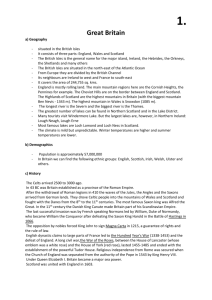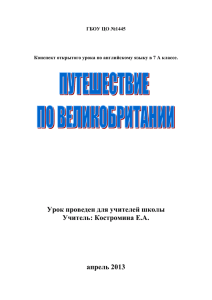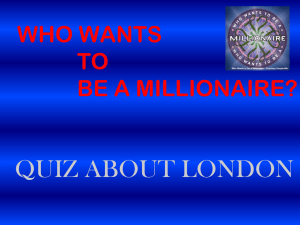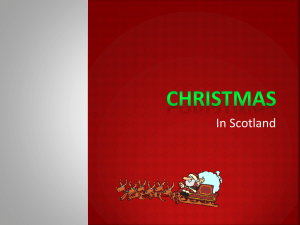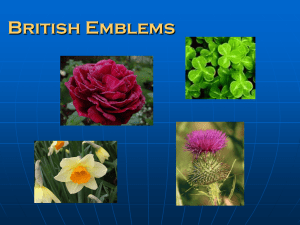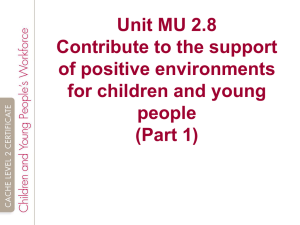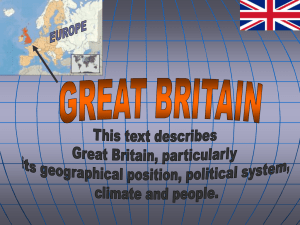THE UNITED OF GREAT BRITAIN AND NORTHERN IRELAND
advertisement
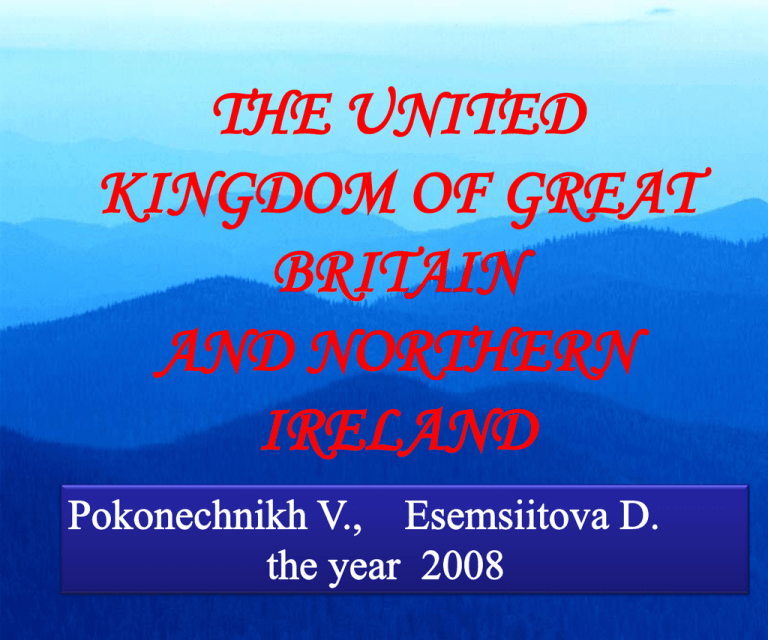
THE UNITED KINGDOM OF GREAT BRITAIN AND NORTHERN IRELAND GEOGRAPHY AND CLIMATE Great Britain is situated to the northwest of Europe on the British Isles. It is made up of England, Scotland, Wales and Northern Ireland. Great Britain is separated from the Continent by the English Channel, and is connected with many countries by sea. England is the southern and central part of Great Britain. Scotland is in the north of the island, and Wales in the west. Northern Ireland is situated in the north-eastern part of Ireland. England, Scotland, Wales and Northern Ireland form the United Kingdom of Great Britain and Northern Ireland with a total area of 94,212 square miles. The climate of the country is mild and warm because of the warm Gulf Stream. Most of the mountains are in the north, in Scotland, but they are not very high. The British Isles have many rivers and lakes. The United Kingdom has some mineral resources. Coal and oil are the most important of them. The United Kingdom is one of the world’s most industrialized countries. Agriculture takes an important sector in economy of the country. The British people grow wheat, fruit, vegetables, oats. London is the capital of country. The most important industrial cities are Manchester, Leeds, Bristol, Edinburgh, Birmingham and others. Edinburgh is the capital of Scotland. London, Liverpool and Glasgow are the biggest English ports. Oxford and Cambridge are famous university cities. The UK is a constitutional monarchy. The official head of state is the king or the queen. But according to the constitution, power in the country belongs to Parliament. The British Parliament consists of the House of Lords and the House of Commons. Members of the House of Commons are elected by the people. Members of the House of Lords are appointed. Parliament makes laws. The head of the Government is the Prime Minister. At present there are four main political parties in Great Britain: the Conservative, the Labor, the Liberal and Social -Democratic Party. The Houses of Parliament Julius Caesar came to Britain in 54 BC. A hundred years later the Romans came again, and this time they stayed for four hundred years (43 AD until 410 AD). Camps for soldiers were constructed at road junctions. These sites of old Roman camps became centers of trade. When the Romans had departed (in 410 BC) the English swept over the country and destroyed almost all the civilization which Rome had established. In the 11th century England was invaded by the Normans. The Norman invasion changed both the history and the language of Britain. The Anglo – Saxon Earl, Harold was chosen to the throne. William a distant relative of the late king also claimed the English throne. William promised the Roman Pope to strengthen his power over England. The battle took place on the 11th of October 1066 at Hastings. The Normans won battle and William became king of England. Two thousand years before the Romans came to Britain the ancient inhabitants started building Stonehenge in Wiltshire. The newest parts of it were built in about 1400 BC – more than three thousand years ago. It is the oldest of Britain’s famous monuments. Huge stones weighing up to 30 tons were brought from hills 20 miles away, and the smaller ones 200 miles from Wales. Some people say Stonehenge was a kind of clock, or calendar for working out the movements of the sun and the moon. Archaeologists used to think that Stonehenge was just a temple for religious ceremonies. Stonehenge The symbol of Wales is a daffodil. The Wales Valley are wonderful. There are many daffodils in the Wales Valleys. The symbol of Scotland is a thistle. In Scotland some men wear kilts. The national instrument of the Scots is the bagpipe. The symbol of England is a red rose. The symbol of Northern Ireland is a shamrock. Ulster is the old name of Northern Ireland. London, one the world’s biggest cities, situated on the River Thames. The British capital is a very old city. We’ll start our tour from Trafalgar Square, which is the geographical centre of London. Trafalgar Square is also historical place. In the middle of it is the famous Nelson Column. Here, there is also the National gallery with its wonderful collection of works. Farther west from Trafalgar Square is the Mall, at the other end of which is Buckingham Palace. Westminster is the most important part of London. Here, there is the Houses of Parliament. In one of their beautiful towers, the Clock Tower, is the famous Big Ben. Opposite the Houses of Parliament is Westminster Abbey. Another interesting sight in the West End is Hyde Park. It is the largest of London parks and famous for its Speakers’ Corner. In the centre of the City There is the Tower of London and St. Paul’s Cathedral. After visiting Hyde Park, it will be convenient to go back towards the east along Piccadilly to Piccadilly Circus or to go the British Museum and the University of London. Westminster Abbey is a very large Gothic church in Westminster, near the Houses of Parliament. The present building was started in 1245. Almost all English kings and queens since William I have been crowned in the Abbey and many famous people are buried there. Big Ben is the large bell in the clock tower of the houses of Parliament in Westminster. The sound of Big Ben striking is well – known to all British people and tower of Big Ben is often used as a symbol of Britain. Tower of London is an ancient fortress to the east of the City of London, on the north side of the River Thames, formerly a place where the king and queen lived, and a prison for important people. It is now a museum, and the place where the crown jewels are kept. The Tower of London is ceremonially guarded by the Yeomen Warders or Beefeaters. In the course of its history it has been a royal palace, a state prison, a citadel and an arsenal. Its many associations with English history make it a popular tourist attraction. Two important parts of it are the Bloody Tower and the White Tower. Tower Bridge is one of London’s best-known landmarks – the distinctive twin drawbridges with Gothic (style) towers over the River Thames near the Tower of London. The bridge was built in the late 19th century, and is the farthest downstream of all London Bridges. St Martin-in-the-Fields is a famous church in Trafalgar Square, built in a neoclassical style in the early 18th century. The main church itself is frequently used for musical performances. Original church on this site stood on open land – hence the name of the church. Royal Albert Hall is a large hall in London, with seating for 8,000, where the annual Promenade Concerts are held, as well as a number of other concerts, parades, meetings and ceremonial and sporting events. Built in 1867-1871 and named in honour of Prince Albert, the husband of Queen Victoria. Halloween is on October 31th. Although it is a much more important holiday in the United States than Britain. People cut horrible faces in pumpkin and put a candle inside, which shines through the eyes and go from house to house saying, “ Trick or treat” Christmas is on December 25th. For most British families, this is the most important holiday of the year, the Christian celebration of the birth of Christ. (1564-1616) William Shakespeare is the world’s greatest poet and dramatist. He was born on April 23, 1564 in Stratford-upon-Avon. His mother, Mary Arden, was a daughter of Robert Arden, a farmer. His father, John Shakespeare, was a glover who had an office at Stratford-upon-Avon. William lived in Stratford until he was about twenty-one, when he went to London. There is a story that Shakespeare’s first work in London was holding rich men’s horses at the theatre door. But nobody can say whether this story is true. Shakespeare wrote 37 plays. Among them are tragedies such as Hamlet, King Lear, Othello; comedies such as The Merry Wives of Windsor, All’s Well That Ends Well, Twelfth Night, Much Ado About Nothing; historical dramas such as Henry IV, Richard III. Shakespeare spent the last years of his life at Stratford, where he died in 1616. He was buried in the church of Stratford. House where William Shakespeare was born. (1759 -1796) Robert Burns was born in the north of Scotland. His Father William was a gardener. When Robert was 13, he had to do most of the work on the farm, for his father was growing old. Those were hard times. Robert was often ill because of the hard work and little food. But in spite of all this, fifteen year-old he began to write. Burns wrote many poems in English, but the best of his works are written in the language of his native Scotland. In his poems he described with love and understanding the simple life he knew, and his poems touch the heart of every reader. Robert Burns died at the age of 37. All his life he had lived very poorly, he had no money and had to work very herd. Among his well-known poems are The Jolly Beggars, Halloween, The two Dogs. Now Robert Burns is Scotland’s national poet and January 25 – the day of his birth – is always celebrated in his country and in other countries. The Beatles are a British popular music group who made their first record in 1962 and became probably the most famous and successful group ever. When they separated in 1970, each member (George Harrison, John Lennon, Paul McCartney, Ringo Starr) of the group continued to work in popular music. Horizontal 1. 2. 3. 4. 5. 6. Who is the official head the state? What is the national instrument of the Scots? What is the symbol of Northern Ireland? Where was born of Robert Burns? What is the symbol of Scotland? What is the symbol of Wales? Vertical 1. 2. 3. 4. What is the capital of Scotland? Which House of Parliament is elected by people? What is the capital of Britain? Who wrote “Hamlet”? 1. 2. 3. 4. 5. 6. What is the official name of Britain? What parts does the United Kingdom consist of? What river is the British capital situated on? What is the symbol of England? When do British people celebrate Christmas? What channel lies between Britain and the continent Of Europe? 7. Where did most of the English Kings and Queens have their coronation ceremonies? 8. What is Big Ben? 9. Who wrote “The two Dogs”? 10. Who wrote “Twelfth Night”? 11. When do British people celebrate Halloween?

